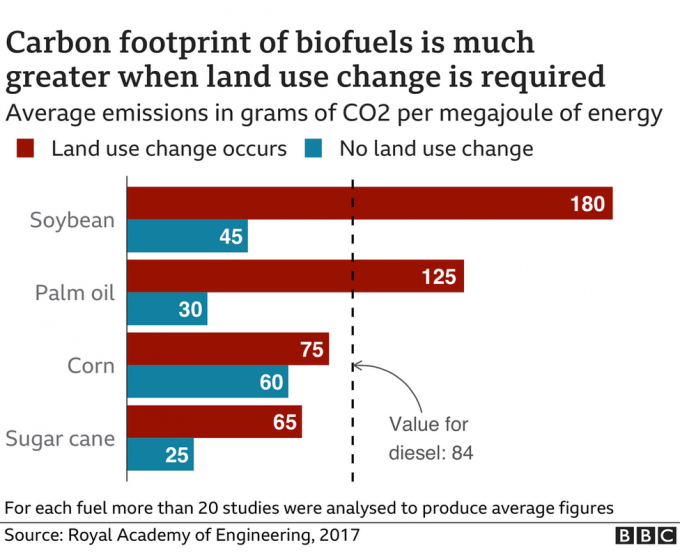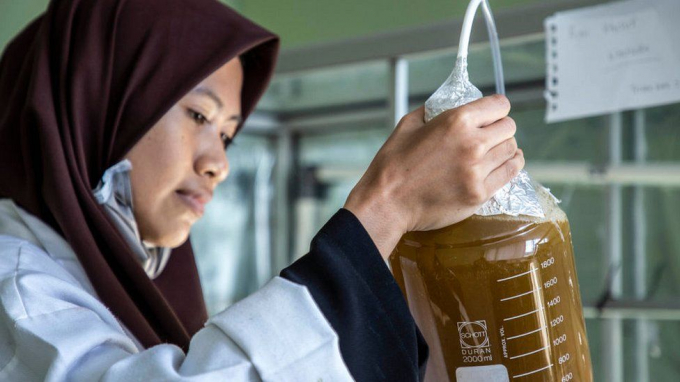November 24, 2025 | 12:14 GMT +7
November 24, 2025 | 12:14 GMT +7
Hotline: 0913.378.918
November 24, 2025 | 12:14 GMT +7
Hotline: 0913.378.918

It's true the annual rate of deforestation has come down. But Indonesia continues to be one of the world's top three countries for the amount of forest loss, primarily because of new palm oil plantations.
It's also said that it will end deforestation by that same date.
But to reduce emissions from its transport sector, it's relying on using more biofuels - production of which can lead to the loss of forested land.
So how can it both curb its emissions using biofuels and end deforestation by 2030?
What is Indonesia's plan for biofuels?
Indonesia is now the third largest producer of biofuels in the world, behind Brazil and the US, and the world's largest producer of biodiesel - a biofuel alternative to regular diesel fuel.
Biofuels come from plant material and animal waste, and can be used to power vehicles or for heating and electricity.
They are considered a renewable alternative to traditional fossil fuels (coal, petrol and diesel) as they can be replenished quicker and release fewer greenhouse gases.
Indonesia produces biodiesel from crops, primarily palm oil, and government policy stipulates that all diesel fuel must contain a mix of at least 30% biodiesel - to rise to 50% by 2025.
The transport sector accounts for 13.6% of the country's emissions and 45% of its energy consumption. The government believes this policy could reduce their transport emissions by 36 million tonnes of CO2 by 2040.
But taken along with an expected 6% annual growth in its vehicle fleet, it means biofuel production will need to increase by nearly 50% over the next three years to meet demand.
This would require a substantial increase in land used for biofuel production, perhaps by as much as 1.2 million hectares - to about a quarter of all palm oil cultivation in the country.
What's the environmental impact of this policy?
In theory, biofuels should reduce emissions compared with fossil fuels because when biofuel crops grow, they absorb carbon from the atmosphere which is then released through burning - meaning there is no net increase in emissions.
The crops can then be replanted and the process started again.
However, problems arise because of land clearing such as deforestation, which is needed to grow these crops.
Forests are one of the most effective systems at absorbing CO2 from the atmosphere, far more so than crops.
Replacing them with biofuel crops means less CO2 is absorbed, and this leads to an increase of greenhouse gases - contributing to global warming.
So when forested land is cleared - as opposed to using existing agricultural land - to grow soybean or palm oil it can end up producing more emissions for each unit of energy than diesel.
The government has tried to implement measures for the sustainable management of its forests. However, earlier this year it failed to extend a ban on new palm oil plantations.
Indonesia pledged to end deforestation by 2030 at COP26, but afterwards, its environment minister said the promise was "clearly inappropriate and unfair".
In a BBC interview in October, Indonesian President Joko Widodo defended his country's deforestation record, and said it had "rehabilitated a lot of hectares" of forests.
It's true the annual rate of deforestation has come down. But Indonesia continues to be one of the world's top three countries for the amount of forest loss, primarily because of new palm oil plantations.
And when approached about this article, Febry Calvin Tetelepta from the presidential office told us palm oil plantations were a more efficient way to produce biofuel than using crops like sunflower and soy bean.
He said palm oil requires relatively smaller amounts of land for the same quantity of oil - which is correct.
What are other countries doing about biofuels?
There are more than 60 countries with a requirement for biodiesel in their fuel supply, but attitudes are changing in some of them.
Germany, the fourth largest global producer of biofuels, says that from 2023 it will no longer produce biodiesel from palm oil because of concerns about deforestation.
The EU has similarly tightened its restrictions.
Brazil - another big user of biofuels - has reduced production this year because of successive droughts, which have lowered yields for soybean and corn.
Thailand has suspended indefinitely the rollout of diesel and biodiesel mixes because higher crop prices have made production unsustainable.
What about other solutions?

Advanced research into biofuels is being carried out in Indonesia. Photo: Getty
Global Forest Watch says there are around 50 to 60 other, more environmentally friendly plants apart from palm oil, like candlenut and coconut, that could be used in Indonesia.
However, research group Carbon Disclosure Project found that certification issues for biofuel production, alongside existing subsidies, encourages producers to continue with deforestation practices as opposed to seeking out sustainable alternatives.
Indonesia says it wants to move towards electric vehicles to cut transport emissions.
But it currently only has a modest plan for 2.2 million electric cars by 2030 and to sell only electric cars and motorcycles by 2050.
Indonesia has more than 21 million vehicles on the road, but only a few thousand were electric by the end of 2020.
And given that 90% of Indonesia's electricity is produced from fossil fuels (mostly coal), running an electric vehicle currently produces significantly more emissions than using diesel or petrol.
Filda Yusgiantoro, director of an Indonesia energy think tank, says given the growing demand for vehicles, "biofuels.. from palm oil will still play a major role in supplying fuel needs for the transportation sector".
(BBC)

(VAN) Brazil's COP30 presidency pushed through a compromise climate deal on Saturday that would boost finance for poor nations coping with global warming but that omitted any mention of the fossil fuels driving it.

(VAN) Poultry farmers in the UK have been warned that they could face one of the worst winters yet for bird flu.

(VAN) Prices of main-crop paddy have risen sharply, with jasmine rice hitting 16,100 baht per tonne — the highest level in years.

(VAN) In Brazil, FAO unveiled a series of reports and initiatives showing how sustainable agrifood systems are a solution to the climate crisis.

(VAN) With names like neodymium and dysprosium, rare-earth elements sound exotic — and their perceived scarcity has only added to the mystique.

(VAN) In a new study published in Trends in Biotechnology, researchers used a gene-editing technology called CRISPR to increase a fungus's production efficiency and cut its production-related environmental impact by as much as 61%- all without adding any foreign DNA.

(VAN) A top official in Beijing’s Cop delegation says China is committed to clean energy – but US’s absence is a problem.